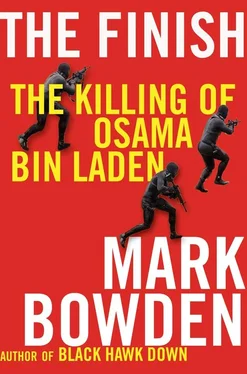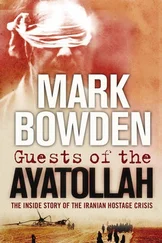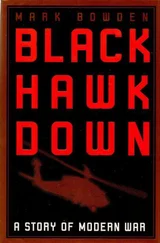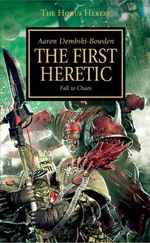By the time the president saw him that morning, Bush had already taken a few minutes to read from his Bible, had jogged in the darkness around the Colony golf course, and had dressed and eaten his breakfast. That day’s briefing had mostly concerned China. The briefing is still classified, but months earlier a U.S. Navy EP-3, a propeller-driven intelligence-gathering aircraft, had collided with a Chinese jet fighter off the island of Hainan, killing the fighter pilot and triggering a small international crisis, the first of the Bush presidency. Morell also had fresh intel from Russia, again still classified, but fallout there from the then recent Robert Hanssen spy scandal had prompted both countries to expel some of each other’s diplomats. Morell then presented new information about the ongoing Palestinian uprising, an increasingly violent affair at the center of the world’s news. One item on the agenda prompted the president to call his national security adviser, Condoleezza Rice, who had stayed behind at the White House, but in later years no one would remember what the call was about. In light of what was coming—all four of the doomed commercial airliners were already in the air—the items on that day’s agenda would soon seem small.
When the briefing was done, Bush left for his scheduled visit to Emma E. Booker Elementary School, where at nine a.m. he was supposed to visit a second grade classroom before an array of television cameras and reporters. They were at the school when news of the second plane came. Morell was waiting with the rest of the president’s staff in a classroom next door. It had a TV set, which was soon showing video of the crash into the South Tower. Both towers were now aflame.
Andrew Card, Bush’s chief of staff, went next door to whisper the news to the president, who was seated in a chair before the classroom, listening to the students read a book about a pet goat.
“A second plane hit the second tower,” said Card. “America is under attack.”
Cameras caught the stunned look on the president’s face. Some would later ridicule him for it, but what is the correct facial expression for news like that? Bush resolved to stay calm. He remained before the class until the story was finished, but his demeanor had dramatically changed. He had been cheerful, enjoying the children’s performance. Now he was grim, his mind clearly elsewhere. When the story was done he complimented the class and then walked briskly into the adjacent classroom. On the TV was video of United Airlines Flight 175 plowing straight into the South Tower in slow motion and erupting into a fireball. Fleischer consulted with the president, who hastily scribbled remarks in longhand before walking back into the crowded classroom to face the cameras and reporters again.
“Ladies and gentlemen, this is a difficult moment for America,” he began.
Planes were falling from the sky, suicide hijackers guiding them into the nation’s iconic public buildings, incinerating themselves and the planes’ passengers and killing thousands. And no one knew how many airplanes there were.
Morell thought they ought to move Bush immediately. He started toward a Secret Service agent, but saw that the protection detail was ahead of him. They pointed him out of the building toward the motorcade. When the president’s short statement was finished they were off at once to the airport.
Bad news kept on coming. A third plane, American Airlines Flight 77, hit the Pentagon while they were still speeding north on Route 41. Suddenly every tall building, every monument, every American landmark seemed in jeopardy. Where would the next one hit? There was nothing fanciful about the breadth of alarm in those first hours. But along with the fear, the attacks provoked something primal and self-protective. Just seventy-one minutes after the North Tower was hit, hundreds of miles west of New York City and high over Pennsylvania, the passengers aboard United Airlines Flight 93 hastily organized and attacked the men who had hijacked their plane. It crashed in a field just east of Pittsburgh, in Shanksville, Pennsylvania.
The reaction was sudden and national. The military scrambled fighters and secured its bases. Airports were closed, streets blocked, buildings vacated.
In Chicago, when Obama realized that no one was going back into the Thompson Center anytime soon he walked to his car and made the short drive to his law office. The firm of Davis, Miner, Barnhill, and Galland was housed in a brick town house. They had a small conference room in the basement with a TV where the office staff gathered to watch the unfolding tragedy. Along with millions around the world, they saw men and women stranded on the upper floors of the Twin Towers, still alive, crowding at windowsills with flames behind them, waving desperately for help that could not reach them, trying to figure out what to do, some of them jumping to their deaths. Obama watched with the others as the towers fell, imagining the thousands trapped inside. They saw the smoke and flames rising from a demolished wall of the Pentagon.
In San Diego, Bill McRaven watched from a hospital bed in his home, where it was still very early in the morning. Even flat on his back, the Navy SEAL captain had a distinct military bearing. His tall body was lean and muscular. His buzz cut drew defiant attention to his jug ears, and the upper and lower halves of his face were slightly askew, which set his long jaw at a slight jutting angle that asserted resolve. Lately, Captain McRaven hadn’t been doing much of anything beyond easing himself from hospital bed to wheelchair and back again. It was a humbling debility for someone so physical. He had been a track star at his high school in San Antonio, Texas, and had then joined the military. Like anyone in an elite special ops unit, he had spent his life pushing himself mentally and physically… which catches up to most people. Two months earlier he’d had a terrifying parachute accident, free-falling 10,000 feet before colliding with the opened chute of another jumper. Violently spinning and only half-conscious, he had managed to pull his rip cord, saving his life, but with one leg tangled in the chute’s cords and the other in its risers, the force of the opening chute had nearly torn him in two, cracking his pelvis, breaking his back, and tearing away muscle from his stomach wall. There weren’t going to be any daring missions in his near future, and even if he managed to rehab out of the chair he would always be held together by plates and pins.
He’d escaped the hospital by having his bed moved to his home, so that’s where he watched the attacks unfold that morning. He wasn’t bitter. McRaven accepted the rough sorting of his profession. He figured that if he’d actually been good enough to free-fall with a SEAL team into combat, he would never have had the accident. He had been dealt out. He wasn’t concerned about losing the chance to advance in rank. If he had been ambitious for rank, he would never have joined a SEAL team. It was the same in the army; special ops were a path to small-team action, not command, which traditionally involved assuming responsibility for more and more men. The regular force saw the “irregulars,” the special ops teams, as… well, irregular. You went that direction to jump out of airplanes and blow things up and maybe get to test yourself on a real mission even when the nation wasn’t officially at war. He was forty-five years old and had served most recently as commodore of the Naval Special Warfare Group in Coronado, which he figured was the best job he would ever have. What he was going to miss was the action.
McRaven had fought in the Persian Gulf War, and had trained for daring missions his entire adult life. There was no way to know exactly how the United States would respond to these attacks, but it was clear that the country was at war and the war was going to pass him by.
Читать дальше












